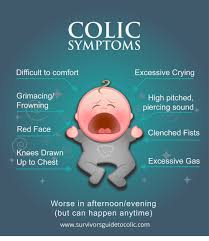Colic pain is a common issue that continues to baffle parents and doctors alike. It can be extremely frustrating when your baby continuosly cries for no apparent reason, and it's even harder when there seems to be nothing you can do to make them stop.
Some of the most common causes of colic pain include reflux, gas problems, milk allergies, DNS (diarrhea containing small quantities of non-digestible solid materials), teething problems, environmental sensitivities such as pet dander or smoke exposure in the home, and stomach virus infections. While many infants eventually outgrow their colicky phase at around 6 months old, some may continue to experience occasional bouts of discomfort well into adulthood.
If your baby is consistently crying for more than 3 hours per day on one or more occasions during the weekdays or weekends; has been cried out by every feedings within 24 hours; refuses all solids except breastmilk; loses weight despite good nutrition intake; exhibits any other concerning symptoms such as fever over 38°C (>100°F); then it would be advisable to seek medical attention.
What causes colic pain?
Colic pain is a symptom that can be caused by various reasons, including dehydration, viruses, and digestive problems. It typically occurs in infants between 6 months and 2 years old and is characterized by excessive crying that cannot be controlled.
There are several things you can do to relieve colic pain: feed your baby breast milk or formula supplemented with bone broth; give your child fruit juice concentrate instead of cow's milk; provide wet nurses immediately after breastfeeding; humidify the home environment; administer probiotics on an as-needed basis via foods or supplements (preferably before bedtime); swaddle your child tightly when he cries to reduce motion anxiety; avoid restrictive diets that may upset the stomach during times of fast growth such as infancy.
Many babies will eventually outgrow colic pain due to enhanced digestion and overall health.
Colic pain home remedies for adults
One of the most common complaints that parents have is colic pain. This pain can occur during infancy, early childhood, or adolescence and is usually characterized by intense abdominal cramps accompanied by vomiting and/or diarrhea. Although there is no specific remedy that works for everyone, many people find relief from traditional home remedies such as soaking in a tub of warm water with baking soda or apple cider vinegar added (citrus fruits also help to increase absorption of these ingredients).
Other popular remedies include: drinking lots of fluids (especially Epsom salt-rich ones) ; eating anti-inflammatory foods; using heat pads on the abdomen; applying cold packs to the abdomen; taking overthecounter medications like ibuprofen or acetaminophen ; and nursing your child if he's breastfeeding.
Can colic go away?
Colic, or recurrent crying in infants and young children, is a condition that can be difficult to treat. However, there are many things that you can do to help ease the symptoms and make your child feel more comfortable. You may want to provide comfort food such as homemade baby cereals or squash soup,uddled up close with your infant during episodes of colic,or try some natural home remediessuch as ginger tea or breast-feeding massage.
If these measures aren't sufficient, you may need professional assistance from a pediatrician who specializes in treating children's conditions. In most cases though, colic eventually resolves on its own without any long-term consequences.





0 Comments